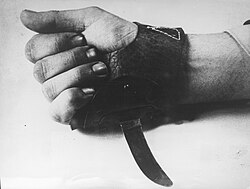Srbosjek
The Srbosjek (Croatian: [Srbosjek] Error: {{Lang}}: text has italic markup (help)) is a wheat sheaf knife that was originally manufactured in Germany for agricultural purposes.

History
The knife gained notoriety in the former Yugoslavian countries because it was used by the Croatian Ustashas during World War II for the killing of prisoners in the concentration camps of the Nazi-ultranationalist Independent State of Croatia, most notably the Jasenovac concentration camp.
Description
The upper part of the knife was made of leather, as a sort of a glove, designed to be worn with the thumb going through the hole, so that only the blade protruded from the hand. It was a curved, 12 cm long knife with the edge on its concave side. The knife was fastened to a bowed oval copper plate, while the plate was fastened to a thick leather bangle.[1] The knife was fixed on the glove plate in order to prevent injuries and to avoid taking care of a separate knife in order to improve the work speed.[2]
Such a type of wheat sheaf knife was manufactured prior to and during World War II by German factory Gebrüder Gräfrath from Solingen under the trademark "Gräwiso".[3][4] Gebrüder Gräfrath was taken over in 1961 by Hubertus Solingen.[5]
Srbosjek Media
Ustaše newspaper proclaims NDH Race Laws, noting that The Leader, Ante Pavelić, signed legal provisions on racial affiliation and the protection of Aryan blood and honor of the Croatian people
Plan of Jasenovac main camp
- Ustaše militia execute prisoners near the Jasenovac concentration camp.jpg
Ustaše militia executing people over a mass grave near Jasenovac concentration camp
- Odlok NDH.JPG
A report on the deportation of Travnik area Jews to Jasenovac and Stara Gradiška camps, March 1942
- Executed prisoners in Jasenovac.jpg
The bodies of prisoners executed by the Ustaše in Jasenovac
- Srbosjek (knife) used in Croatia - 1941–1945.jpg
An agricultural knife nicknamed "Srbosjek" or "Serbcutter", strapped to the hand. It was used by the Ustaše militia for the speedy killing of inmates at Jasenovac
- Voz Jasenovac.JPG
Train that carried prisoners to Jasenovac.
- Свјетлопис меморијлног центра Јасеновац10.jpg
- Sa izložbe o Jasenovcu, Muzej Republike Srpske1.jpg
Ustaše death camp reconstruction, museum exhibit in Banja Luka
Related pages
References
- ↑ Taborišče smrti--Jasenovac by Nikola Nikolić (author), Jože Zupančić (translator),Založba "Borec", Ljubljana 1969
The knife described on page 72: 'Na koncu noža, tik bakrene ploščice, je bilo z vdolbnimi črkami napisano "Grafrath gebr. Solingen", na usnju pa reliefno vtisnjena nemška tvrtka "Gräviso" '
Picture of the knife with description on page 73: 'Posebej izdelan nož, ki so ga ustaši uporabljali pri množičnih klanjih. Pravili so mu "kotač" - kolo - in ga je izdelovala nemška tvrtka "Gräviso" ' - ↑ Margaret E. Wagner, David M. Kennedy, Linda Barrett Osborne, Susan Reyburn: The Library of Congress World War II Companion, Library of Congress, Simon & Schuster, 2007, ISBN 0743252195, 9780743252195 p. 683
- ↑ Vladimir Dedijer (Editor), Harvey L. Kendall (Translator), The Yugoslav Auschwitz and the Vatican: The Croatian Massacre of the Serbs During World War II (Prometheus Books. July 1992)
- ↑ Für die Richtigkeit: Kurt Waldheim by Hanspeter Born Schneekluth, 1987
ISBN 3795110556, 9783795110550, page 65
Beliebt war das sogar wettbewerbsmäßig organisierte Kehledurchschneiden mit einem speziellen Krumm-messer Marke Gräviso. - ↑ "888knivesrus.com - Diese Website steht zum Verkauf! - Informationen zum Thema 888knivesrus". www.888knivesrus.com. Archived from the original on 2008-11-10. Retrieved 2011-05-05.
Bibliography
- Ladislaus Hory and Martin Broszat: Der kroatische Ustascha-Staat, 1941-1945, Deutsche Verlags-Anstalt Stuttgart, 1964
- Dave Hunt: Die Frau und das Tier Geschichte, Gegenwart und Zukunft der römischen Kirche © 1994 by Dave Hunt, Herausgegeben von Harvest House Publishers, Eugene, Oregon - Das Abschlachten der Serben Chapter, pages 289-301
- Egon Berger: 44 mjeseca u Jasenovcu, Graficki Zavod Hrvatske, Zagreb 1966
Other websites
- The Vatican's Holocaust by Avro Manhattan Archived 2020-09-11 at the Wayback Machine
- Jasenovac Research Institute Archived 2016-06-27 at the Wayback Machine
- Blood and Ashes of Jasenovac by Lordan Zafranovic